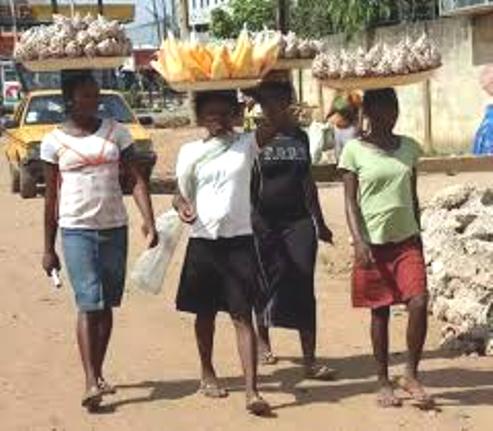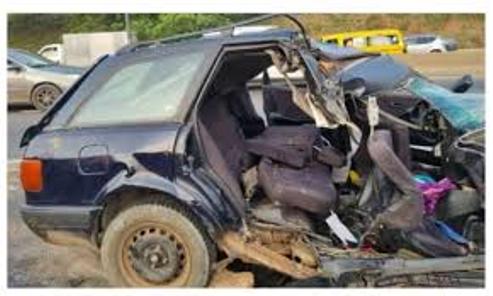By Young Erhiurhoro

LAGOS JULY 16TH (NEWSRANGERS)-Street hawking as a form of marketing or trading is defined as an act of selling goods by traders from one place to another especially along streets or local markets in both rural and urban communities. This form of trading is usually carried out through vehicles, motorcycles, bicycles, wheelbarrows, trucks and trekking by daily income earners or short profit traders.
Street hawking is mostly done by both men and women especially Hausa and Igbo men by putting the goods on trays, buckets or empty cartoons and put the loads on their heads. The goods hawked by Hausa and Igbo men are mostly non-perishable goods like clothes, jewelries, household utensils, pomades, agricultural implements etc.
Another important feature of street hawking we must note here is that, the trade became dominant in our business life immediately after the Nigerian civil war (Biafran War) ended in 1970. The aftermath of the war was hard and harsh economic conditions on the populace especially the Igbo people that were the primary victims of the war. In order to make both ends meet, many people were forced into street hawking. This also affected the Niger Delta people, but with slight differences with the one of the Igbo people.
The street hawkers of the Igbo and Hausa people then was mainly men, unlike the one of the Niger Delta region that was highly dominated by women and children. Another difference between the two is that, the Niger Delta people were mainly into perishable goods like fishes, meat, peppers, groundnuts, tomato, garri, starch, fruits, vegetables and other perishable goods. The reason why women dominated the street hawking in the Niger Delta region is not far-fetched. It’s because Niger Delta men naturally believe that they are dignified men and couldn’t take such menial jobs as to selling in the streets. Such form of trading is meant for women and children and not for men like those in the Niger Delta.
However, the major purpose of writing this piece is to present street hawking as a new way of raping young girls and women in Nigeria today. You know, we Nigerians can do anything if the opportunity is provided. Without doubt, rape cases are on the increase in the country in recent times. Almost everyday, a case of a young girl or woman that was raped must be reported on the news and the social media. The reporters are not far from the truth. Many of these young girls are raped whenever they are hawking along streets by bad boys. This is one of the cheapest and easiest way of raping young girls in the Nigerian society today.
To corroborate the above fact, it was even reported some time ago that two young girls that were selling oranges were raped by set of cultists in an uncompleted building where they were holding their meeting in Enugu state. According to the report, the two young girls were found dead after few days. Similar cases also happened to many young girls in Lagos state and other northern states in the country. What about young girls in the Niger Delta region? They are not free from this social menace. Have we forgotten that young girl that was forced into a car in Edo state immediately the poor girl rushed to sell tapioca and fried maggots to the driver? Many stories abound in different communities across the Niger Delta region where young girls were raped as a result of street hawking.
How can our young girls overcome this menace of raping because of street hawking? To start with, if we agree from available publications, reports and statistics by different social agencies or gender based organizations that street hawking is one of the causes or modern way of raping young girls and women in the country, then the Nigerian legislature must come up with acts and laws to prohibit street hawking by children in Nigeria. In the real sense, such laws are already in existence in the country but the Nigerian judiciary lacks the power to enforce them on culprits or offenders. Nigerian laws are only active in paper but lacks judicial merit on practice as a result of poor judicial system in the country. To achieve this, both the Nigerian legislature and the judiciary must be up to their constitutional responsibilities to the citizenry, especially by protecting their fundamental rights.
Secondly, one of the reasons why these young girls are into street hawking is because of poverty and hard conditions of life. So if the Nigerian government is really showing concern for what our poor girls are passing through in this country, then the government should embark on providing welfare services to the poor and the less privileged in the society. There should be different social security programmes designed by the various state ministries of women affairs and social development to cater for the essential needs of girls and women in the country especially in the area of education of the girl child or acquiring a skill to make her self-employed. This is a way of making our young girls and women economically sufficient in life.
Thirdly, the Nigerian government must pursue gender equality and social justice amongst men and women in this country. In Nigeria, the educational rights of girls are being trampled upon by many parents, even in this modern days. It’s a natural phenomenon among many men in Africa that, sending female children to school is a waste of time and financial resources. This is because they have the belief that girls would be married away to other men outside their families or communities at the end of their education. They also have the belief that women’s time of fertility to produce children is very short and therefore, shouldn’t be wasted on schooling or learning a trade. These set of archaic beliefs are more pronounced in rural communities in Nigeria. In fact, this is one reason why so many girls are deprived of education today in the country. They are rather pushed into street hawking by their parents to help sustain the family by boosting its daily income to cater for the male children. This is gender inequality in high places.
Conclusively, all the state governments in the country through their various ministries of education (basic and secondary) should take proactive steps in monitoring both rural and urban communities to remove young girls from the streets during school hours or when school is in full session. This is one way of checkmating the high rate of rape in our communities and to also stop young girls from indulging into the art of street hawking. In another sense, it’s a way of the Nigerian government to prove to its citizenry and the world that Nigerian laws are not only in the paper but are practically enforceable. This means, every offender must be made to face the wrath or consequences of the law whenever the law is contravened or broken. Street hawking should be prohibited to stop the menace of rape amongst young girls in Nigeria. A stitch in time saves nine!
Young Erhiurhoro;Kjc is a reporter and a member of the Urhobo Historical Society.










